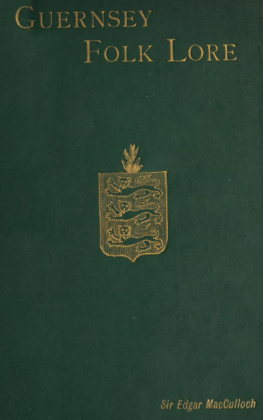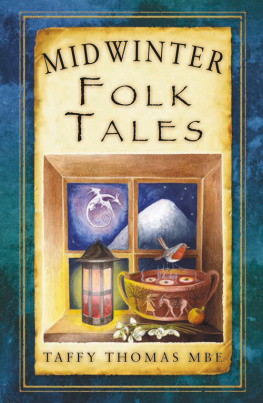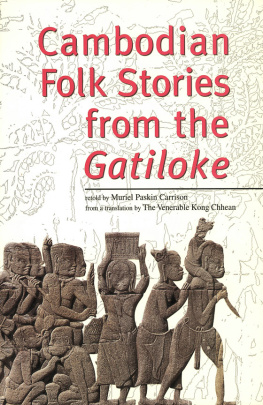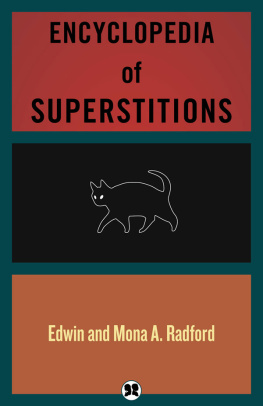Table of Contents
GUERNSEY FOLK-LORE.
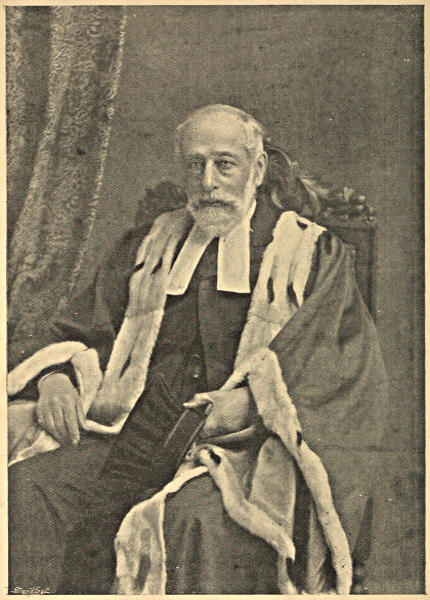
SIR EDGAR MacCULLOCH
In his Robes as Bailiff of Guernsey.
GUERNSEY FOLK-LORE
A COLLECTION OF
POPULAR SUPERSTITIONS, LEGENDARY TALES,
PECULIAR CUSTOMS, PROVERBS, WEATHER SAYINGS, ETC.,
OF THE PEOPLE OF THAT ISLAND .
FROM MSS. BY THE LATE
SIR EDGAR MacCULLOCH, Knt. , F.S.A., &c.
Bailiff of Guernsey .
Edited by Edith F. Carey.
IN WINTERS TEDIOUS NIGHTS SIT BY THE FIRE
WITH GOOD OLD FOLKS, AND LET THEM TELL THEE TALES
OF WOEFUL AGES LONG AGO BETID.
K. RICHARD II., ACT V., SC. 1.
LA LEGENDE, LE MYTHE, LA FABLE, SONT, COMME LA CONCENTRATION DE LA VIE NATIONALE, COMME DES RESERVOIRS PROFONDS OU DORMENT LE SANG ET LES LARMES DES PEUPLES.BAUDELAIRE.
AUTHORS PREFACE.
Of late years the ancient superstitions of the people, their legendary tales, their proverbial sayings, and, in fine, all that is designated by the comprehensive term of Folk-Lore, have attracted much and deserved attention. Puerile as are many of these subjects, they become interesting when a comparison is instituted amongst them as they exist in various countries. It is then seen how wide is their spreadhow, for example, the same incident in a fairy tale, modified according to the manners and customs of the people by whom it is related, extends from the remotest east to the westernmost confines of Europe, and is even found occasionally to re-appear among the wild tribes of the American Continent, and the isolated inhabitants of Polynesia. The ethnologist may find in this an argument for the common origin of all nations, and their gradual spread from one central point,the philosopher and psychologist may speculate on the wonderful construction of the human mind, and, throwing aside the idea of the unity of the race, may attribute the similarities of tradition to an innate set of ideas, which find their expression in certain definite forms,while the historian and antiquary may sometimes discover in these popular traditions, a confirmation or explanation of some doubtful point. Lastly, he whose sole object is amusement, and whose taste is not entirely vitiated by the exaggerated and exciting fiction of modern times, will turn with pleasure to the simple tales which have amused his childhood, and which are ever fresh and ever new.
Much of this ancient lore has already perished, and much is every day disappearing before the influence of the printing press, and the consequent extension of education. This would scarcely be regretted, if, at the same time, the degrading superstitions with which much of these old traditions are mixed up could disappear with them, but unfortunately we find by experience that this is not the case, and that these popular delusions only disappear in one form to re-appear in another, equally, if not more, dangerous.
A desire to preserve, before they were entirely forgotten, some of the traditional stories, and other matters connected with the folk-lore of my native island, induced me to attempt to collect and record them, but I have found the task, though pleasant, by no means easy. The last fifty years has made an immense difference here as elsewhere. The influx of a stranger population, and with it the growth and spread of the English tongue, has changed, or modified considerably, the manners and ideas of the people, more particularly in the town. Old customs are forgotten by the rising generation, what amused their fathers and mothers possesses little or no interest for their children, and gradually even the recollection of these matters dies away. There are good grounds for supposing that, although the belief in witchcraft attained its greatest development in the century which succeeded the Reformation, and was as much the creed of the clergy as of the laity, other popular superstitions were looked upon with disfavour, and especially all those customs which were in any way, even remotely, connected with the observances of the ancient form of religion. The rapid spread of dissent among the middle and lower classes of society within the last half century has certainly not had the effect of diminishing popular credulity with respect to the existence of sorcerers and their supernatural powers, but, by discouraging the amusements in which the young naturally delight, and in which the elders took part, it has broken one of the links which connected the present with the past.
Doubtless did one know where to look for it much might still be gleaned among the peasantry, but all who have attempted to make collections of popular lore know how difficult it is to make this class of people open themselves. They fear ridicule, and cannot conceive what interest one can have in seeking for information on subjects whichwhatever may be their own private opinionthey have been taught to speak of as foolishness.
Some of the stories in the following compilation were related to me by an old and valued servant of the family, Rachel du Port, others were kindly communicated to me by ladies [1] and others, who had derived their information from similar sources, and whose names I have appended to them, and much is the result of my own research and observation. The subject matter of the following pages, having been collected at various times, and written down as it came to hand, is not arranged as it ought to be, and there are necessarily some repetitions. Whether, after all, the work is worthy of the time that has been spent on it, the reader must decide for himself. Suffice it to say that as far as regards myself it has afforded an occupation and amusement.
Edgar MacCulloch.
Guernsey, February, 1864.
[1] The legends collected by Miss Lane (Mrs. Lane Clarke) were subsequently published by her in the charming little book called Folk-Lore of Guernsey and Sark , of which two Editions have been printed.
EDITORS PREFACE.
Sir Edgar MacCulloch at his death, which occurred July 31st, 1896, bequeathed his manuscript collection of Guernsey Folk-Lore to the Royal Court of Guernsey, of which he had been for so many years Member and President.
This collection was subsequently handed over to me by Sir T. Godfrey Carey, then Bailiff, and the other Members of the Court, to transcribe for publication: it was contained in three manuscript books, closely written on both sides of the pages, and interspersed with innumerable scraps of paper, containing notes, additions and corrections; as Sir Edgar himself says in his preface, the items were written down as collected, local customs, fairy tales, witch stories, one after the other, with no attempt at classification. In literally transcribing them I have endeavoured to place them under their different headings, as recommended by the English Folk-Lore Society, and have inserted the notes in their proper places; and I am responsible for the choice of the quotations heading the various chapters. In every other particular I have copied the manuscript word for word as I received it. It took me over three years to transcribe, and was placed by the Royal Court in the printers hands in February, 1900.
It will be noticed that three sizes of type have been used throughout the book; Sir Edgar MacCullochs subject matter has been printed in the largest, the Authors notes to his own text being in the medium, while the notes printed in the smallest type contain additional legends and superstitions, which have been told me, or collected for me, by and from the country people, and which I have added, thereby making the collection more complete. Also, at the end of the book, is an appendix containing a few of the legends collected by myself, which were too long to insert as notes, and a small collection of old Guernsey songs, which I have written down from the lips of the older inhabitants, and which, in one of the last conversations I had with Sir Edgar MacCulloch on the subject, he strongly recommended should be included in any collection of Guernsey Folk-Lore that should ever be published.

